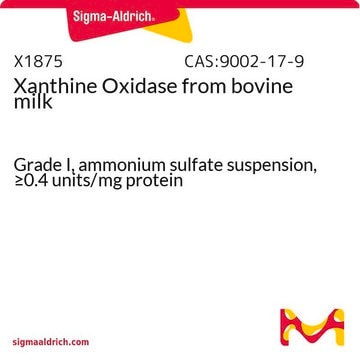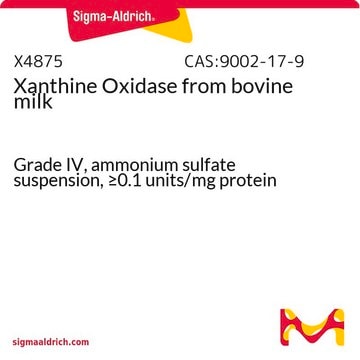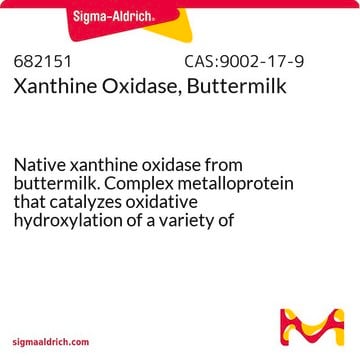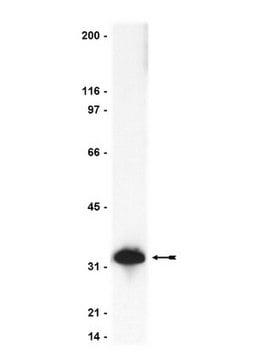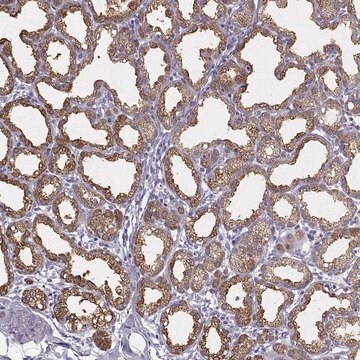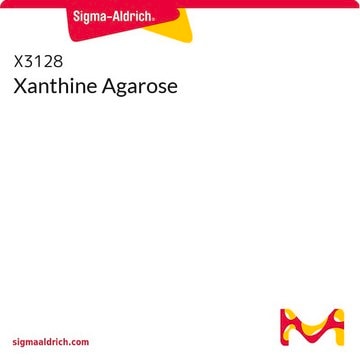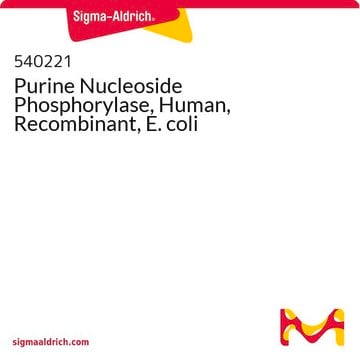10110434001
Roche
Xanthine Oxidase (XOD)
from cow milk
Synonyme(s) :
XOD
Se connecterpour consulter vos tarifs contractuels et ceux de votre entreprise/organisme
About This Item
Produits recommandés
Source biologique
bovine milk
Niveau de qualité
Forme
suspension
Activité spécifique
~1 units/mg protein (At 25 °C with xanthine as the substrate.)
Conditionnement
pkg of 1 mL (20 U)
Fabricant/nom de marque
Roche
pH optimal
8.5-9.0
Conditions d'expédition
wet ice
Température de stockage
2-8°C
Catégories apparentées
Description générale
Xanthine Oxidase (XOD) is a metal flavoprotein. It has FAD, molybdenum and iron in the ratio 2:2:8.
Xanthine:oxygen oxidoreductase
Application
Xanthine Oxidase (XOD) has been used in the assessment of XOR-mediated NO production from NDHP and assessment of nitrite-derived NO in liver and purified XOR.
Xanthine Oxidase has been used to study tyrosine nitration.
Actions biochimiques/physiologiques
Xanthine Oxidase (XOD) exhibits a broad substrate specificity including aldehydes, purines and pteridines. Furthermore, this enzyme reduces oxygen to generate superoxide, hydrogen peroxide and reactive oxygen species (ROS). It also reduces nitrite to yield reactive nitrogen species (RNS), such as peroxynitrite and nitric oxide. Owing to its ability to generate RNS and ROS, XOD might play an important role as an antimicrobial agent in the neonatal gut, thereby complementing endogenous enzyme of the intestinal epithelium.
Qualité
Contaminants: <0.005% guanase, NP and uricase, each, <0.05% ADA, <0.05% alkaline phosphatase (4-nitrophenyl phosphate as the substrate)
Note: Chromatographically purified.
Note: Chromatographically purified.
Séquence
XOD is a dimer. Each subunit contains 1 atom of molybdenum, 2 iron-sulfur centers (non-heme iron, ferredoxin-type) and 1 molecule of FAD.
Définition de l'unité
One unit (U) xanthine oxidase will produce 1 μmol of uric acid (E293nm = 12.2 mmol -1 x L x cm-1) from the oxidation of 1 μmol of xanthine in 1 min at 25 °C and pH8.5.
Forme physique
Suspension in 3.2 M ammonium sulfate solution, 10 mM EDTA, pH approximately 8
Notes préparatoires
Activator: O2
Stabilizers: The substance is stabilized by the addition of EDTA; salicylate is not added.
Stabilizers: The substance is stabilized by the addition of EDTA; salicylate is not added.
Autres remarques
For life science research only. Not for use in diagnostic procedures.
Code de la classe de stockage
12 - Non Combustible Liquids
Classe de danger pour l'eau (WGK)
WGK 1
Point d'éclair (°F)
does not flash
Point d'éclair (°C)
does not flash
Certificats d'analyse (COA)
Recherchez un Certificats d'analyse (COA) en saisissant le numéro de lot du produit. Les numéros de lot figurent sur l'étiquette du produit après les mots "Lot" ou "Batch".
Déjà en possession de ce produit ?
Retrouvez la documentation relative aux produits que vous avez récemment achetés dans la Bibliothèque de documents.
Les clients ont également consulté
International Dairy Journal
R. Harrison.
Science, 16 (6), 546-554 (2006)
T Sawa et al.
The Journal of biological chemistry, 275(42), 32467-32474 (2000-07-25)
Peroxynitrite (ONOO(-)) is a potent nitrating and oxidizing agent that is formed by a rapid reaction of nitric oxide (NO) with superoxide anion (O(2)). It appears to be involved in the pathophysiology of many inflammatory and neurodegenerative diseases. It has
Methods of Enzymatic Analysis (2012)
XANTHINE OXIDASE. VI. INFLUENCE OF PH ON SUBSTRATE SPECIFICITY.
L GREENLEE et al.
The Journal of biological chemistry, 239, 1090-1095 (1964-04-01)
Synthesis and characterization of a novel organic nitrate NDHP: Role of xanthine oxidoreductase-mediated nitric oxide formation.
Zhuge Z, et al.
Redox Biology, 13, 163-169 (2017)
Notre équipe de scientifiques dispose d'une expérience dans tous les secteurs de la recherche, notamment en sciences de la vie, science des matériaux, synthèse chimique, chromatographie, analyse et dans de nombreux autres domaines..
Contacter notre Service technique
